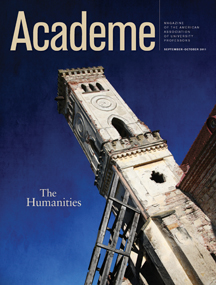 The road to dystopia is paved with both small cuts and big budget holes. Some of the cuts seem tiny, almost invisible; some of the budget holes so big, you could drive whole programs into them.
The road to dystopia is paved with both small cuts and big budget holes. Some of the cuts seem tiny, almost invisible; some of the budget holes so big, you could drive whole programs into them.
The September–October issue is the second of a triptych of
Academe issues devoted to universities in trouble. Our
July–August issueaddressed organizing in hard times.
This issueis devoted to the humanities. In November–December, guest editor Christopher Newfield will take on the escalating troubles at public universities.
Note that I’m not using the word “crisis.” Nonetheless, as historian Ellen Schrecker notes in her trenchant review essay, “
The Humanities on Life Support,” the future of the humanities “looks grim indeed.”
And it’s not just in the United States. English art historian, novelist, and journalist Iain Pears writes, in “
A Price above Rubrics,” that the humanities and arts are particularly vulnerable in Britain, where universities made a “Mephistophelian bargain” about their abilities to create and deliver quick economic solutions and are now paying a terrible price.
In her noir-ish essay, “
Strangers on a Train,” Duke University professor Cathy N. Davidson, newly appointed to the National Council on the Humanities, examines the complicit role the humanities themselves have played in their own continuing crisis.
Russell A. Berman, president of the Modern Language Association, looks at “
The Real Language Crisis,” and Princeton postdoc and academic labor expert Monica F. Jacobe examines what it means when faculty, many of them in contingent positions, not only can’t deliver
a ticket to the middle class for their students but also are struggling themselves. What those students do—and don’t—learn in college is the subject of
Academically Adrift, a much-discussed book that historian Sarah E. Igo
reviews in this issue.
One such chapter is profiled in this issue:
the AAUP chapter at the University of Northern Iowa which stuck to its ground and ultimately won 3.5 percent raises from an administration that claimed to be broke—while also spending heavily on a new public relations campaign.
You can respond to
Academe articles by using the comment function on our website or by writing to
academe@aaup.org.
 The road to dystopia is paved with both small cuts and big budget holes. Some of the cuts seem tiny, almost invisible; some of the budget holes so big, you could drive whole programs into them.
The road to dystopia is paved with both small cuts and big budget holes. Some of the cuts seem tiny, almost invisible; some of the budget holes so big, you could drive whole programs into them.
No comments:
Post a Comment